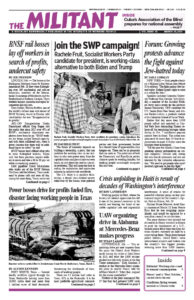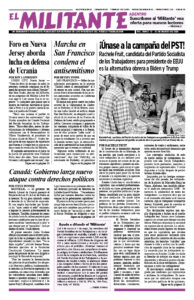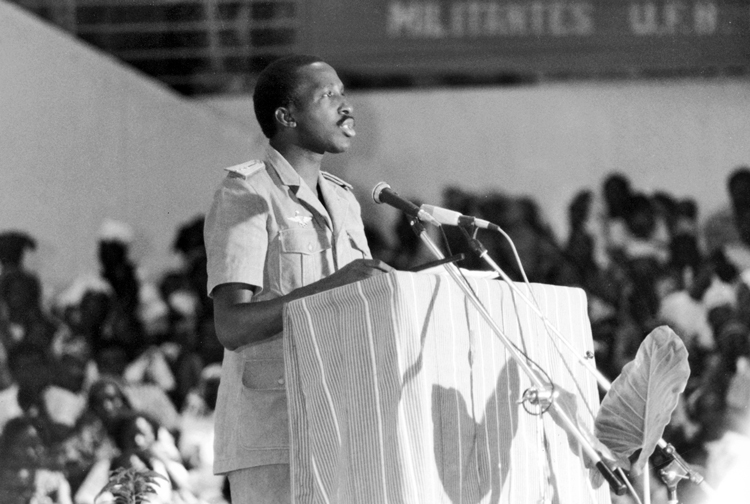To mark International Women’s Day, the Militant is running this excerpt from a speech by Thomas Sankara, leader of the popular democratic revolution in Burkina Faso, to a rally of several thousand women on March 8, 1987. It is from the French edition of Women’s Liberation and the African Freedom Struggle by Sankara, one of Pathfinder’s Books of the Month for March. Sankara had been won to Marxism before leading an uprising in Burkina Faso in West Africa in August 1983. Inspired by the Cuban Revolution, he mobilized workers and peasants, women and youth to carry out deep-going social measures in one of the poorest countries in the world, as well as to extend international solidarity. He was assassinated in a counterrevolutionary coup in October 1987. Copyright © 2008 by Pathfinder Press. Reprinted by permission.
Though the August revolution has undoubtedly done much for the emancipation of women, this is still far from adequate. Much remains for us to do. To better appreciate what remains to be done, we must be more aware of the difficulties still to be overcome. There are many obstacles and difficulties. At the top of the list are the problems of illiteracy and low political consciousness — both of which are intensified by the inordinate influence that reactionary forces exert in backward societies like ours. We must work with perseverance to overcome these two main obstacles. Because as long as women don’t have a clear appreciation of the just nature of the political battle to be fought and don’t see clearly how to take it forward, we can easily stop making headway and eventually slip backward.
This is why the Women’s Union of Burkina should fully live up to its role. The women of the UFB should strive to overcome their own weaknesses and break with the kind of practices and behavior traditionally thought of as female. …
Together we must collectively take care that women retain access to work. It is work that emancipates and liberates women by assuring them economic independence and a greater social role, as well as a more complete and accurate understanding of the world. …
[T]he transformation our society has been going through since August 4, 1983, [is] so that equality between men and women is a tangible reality. The new labor code, now being drawn up and debated, should express how profoundly our people aspire to social justice. It should mark an important stage in the work of destroying the neocolonial state apparatus — a class apparatus fashioned and shaped by reactionary regimes to perpetuate the system that oppressed the popular masses, especially women.
How can we continue to accept that a woman doing the same job as a man should earn less? Can we accept the levirate and dowries, which reduce our sisters and mothers to common commodities to be bartered for? There are so many things that medieval laws continue to impose on our people, on women. It is only just that, finally, justice be done. …
And what about the all-consuming and mind-deadening housework that tends to turn you into a robot and to leave no time or energy to think! This is why resolute action must be undertaken aimed at men and at setting up a large-scale network of social facilities such as nurseries, day-care centers, and cafeterias. This would allow women to more easily take part in revolutionary debate and action. Each child, whether rejected as the mother’s failure or doted on as the father’s pride, should be of concern to society as a whole, every one the object of society’s attention and affection. Men and women will, from now on, share all the tasks in the home.
The plan of action in favor of women should be a revolutionary tool for the general mobilization of all the political and administrative structures in the effort to liberate women. I repeat, comrade militants: before it can correspond to the real needs of women, this plan must be subjected to a democratic discussion at every level of the UFB’s structures.
The UFB is a revolutionary organization. As such, it is a school for popular democracy, governed by the organizational principles of criticism and self-criticism and democratic centralism. It intends to differentiate itself from those organizations where mystification has won out over concrete goals. But such a differentiation can be effective and permanent only if the comrades of the UFB carry out a resolute struggle against the weaknesses that unfortunately still persist in some female milieus. Because we are not talking at all here about bringing women together for the sake of appearances or for any other electoralist, demagogic, or otherwise reprehensible ulterior motive.
We are talking about bringing together women fighters to win victories. We are talking about fighting in an organized way and on the basis of a series of activities decided democratically within their committees, taking fully into account each revolutionary structure’s own organizational autonomy. Every UFB official must have fully absorbed her role in her structure in order to be effective in action. This requires that the Women’s Union of Burkina carry out vast campaigns of political and ideological education of its officials, so as to strengthen the UFB structures on all levels.
Comrade militants of the UFB, your union — our union — should participate fully in the class struggle on the side of the popular masses. Those millions whose consciousness was dormant and who have now been awakened by the coming of the revolution represent a formidable force. On August 4, 1983, we Burkinabe? made a decision to rely on our own resources, which means in large part on the resources that you women represent. To be useful, your energies have to be focused on the struggle to eliminate every breed of exploiter and imperialism’s economic domination. As a structure for mobilization, the UFB will have to forge a highly developed political awareness among its militants, so they can make a completely revolutionary commitment as they carry out the different actions initiated by the government to improve the position of women.


